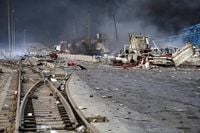On Sunday, April 27, 2025, the Kremlin announced that Russian President Vladimir Putin extended an offer of assistance to Iran in the wake of a devastating explosion at the port of Bandar Abbas. This tragic incident, which occurred on Saturday, April 26, has been attributed to an explosion of chemical materials and has resulted in significant casualties.
According to reports from Iranian official media, the explosion claimed the lives of at least 28 individuals and left over 800 injured, marking it as one of the most catastrophic events in the region in recent years. Bandar Abbas, located in southern Iran, is the country’s largest port and a critical hub for maritime trade.
In a message published on the Kremlin's website, Putin expressed his "words of sympathy and support to the families of the victims, as well as wishes for recovery to all the injured." He also conveyed his condolences to Iran's Supreme Leader Ali Khamenei and President Masoud Bezhakian, highlighting the depth of the tragedy and the widespread damage caused by the explosion.
The Russian Ministry of Emergency Situations confirmed that Putin has ordered the dispatch of several emergency aircraft to assist in the aftermath of the explosion. Among the aircraft being sent are a Beriev Be-200 amphibious plane, which is specialized in firefighting, and a military transport aircraft of the Ilyushin Il-76 type. This aid is intended to support Iran in its recovery efforts and to help manage the immediate consequences of the disaster.
"We are ready to provide the necessary assistance to deal with the consequences of this incident," Putin stated, reaffirming Russia's commitment to support Iran during this challenging time. The Kremlin's proactive approach to offering help reflects the ongoing complexities of international relations in the region, especially in light of the recent tensions between Iran and Western nations.
The explosion at the Shahid Rajaei port in Bandar Abbas has raised questions regarding safety protocols and regulatory oversight concerning hazardous materials. Eyewitness accounts describe a powerful blast that shook the area, leading to panic and chaos among the local population. Rescue operations were swiftly initiated, with emergency services working tirelessly to assist the injured and recover those trapped in the debris.
In the aftermath of the explosion, Iranian officials have been assessing the damage and coordinating with local and international agencies to manage the crisis effectively. The scale of the injuries and fatalities has prompted calls for thorough investigations into the cause of the explosion, as well as discussions about improving safety measures in industrial areas.
The Iranian government has expressed gratitude for the support offered by Russia, viewing it as a sign of solidarity in times of crisis. Analysts suggest that this incident may also serve to strengthen the bilateral relationship between Iran and Russia, particularly in the context of their shared interests in regional stability and economic cooperation.
As the situation continues to unfold, the Iranian authorities are working diligently to provide medical care for the injured and to restore order in the affected areas. The community response has been remarkable, with many volunteers stepping forward to assist those in need, showcasing the resilience and solidarity of the Iranian people.
In light of this tragic event, the international community is closely monitoring the situation, with various governments offering condolences and support to the victims' families. The explosion not only highlights the dangers associated with hazardous materials but also raises awareness of the necessity for stringent safety regulations in industrial operations.
As investigations proceed, the focus will likely turn to ensuring that such a disaster does not occur again. The Iranian government is expected to implement new safety protocols and engage in discussions with international experts to bolster its industrial safety standards.
The explosion in Bandar Abbas serves as a stark reminder of the potential risks associated with chemical materials and the importance of preparedness in mitigating such disasters. As rescue and recovery efforts continue, the hope remains that the affected families will receive the support they need during this difficult time.





